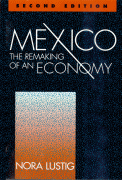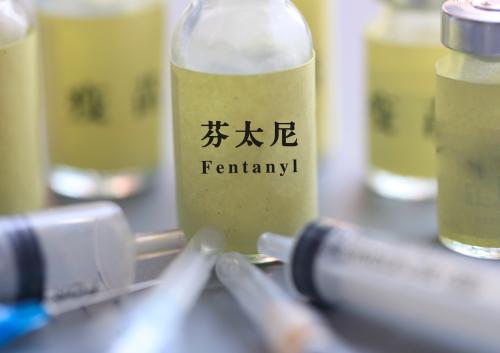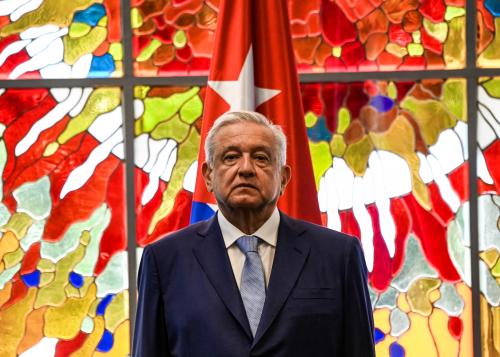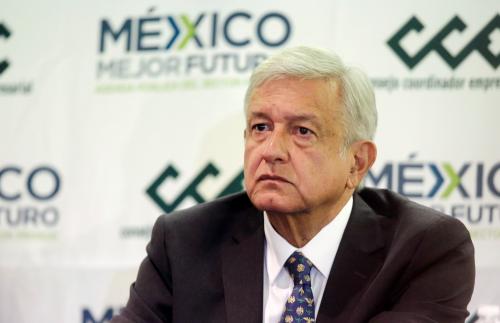As Mexico’s Senate celebrated the passage of a bill designed to curb the power of the National Electoral Institute (INE), the non-partisan and independent agency that oversees elections, the country took another step backward toward its decades-long authoritarian past. Despite corruption, violence, and inequality, Mexico has functioned as an electoral democracy for nearly three decades — with political competition and a vibrant civil society. Much of that success is due to the INE.
Under President Andrés Manuel López Obrador, a pugnacious and charismatic leader who swept to power in 2018, Mexico’s independent institutions are slowly losing their ability to serve as a counterweight to the executive. The latest attack on the INE may be López Obrador’s most brazen of all. Yet, the U.S. government has cautiously maneuvered to avoid losing Mexico’s cooperation on vital domestic issues, particularly immigration along the southern border. However, failing to speak out emphatically against Mexico’s steady march back toward authoritarianism — despite recent rhetoric about “standing up for democracy” — comes with its own risks. An unstable or even autocratic Mexico could exacerbate domestic challenges, including the fight against the opioid epidemic, turbocharged by fentanyl, and relegate President Joe Biden’s seemingly firm commitment to democratic governance to mere rhetorical bluster.
The INE and the demise of Mexico’s hegemonic-party autocracy
For much of the 20th century, Mexico operated as a hegemonic-party autocracy with the Institutional Revolutionary Party (PRI) at the helm. In this system, elections were held regularly to deter dissent by party elites, ensure the controlled rotation of power, and publicly signal overwhelming support for the PRI.
By the late 1980s, the economic and political dynamics of Mexico had changed, making the PRI’s grip on power less secure. The 1988 elections — the first serious electoral competition in Mexico — were marred by widespread fraud. Although the PRI claimed the presidency, the government established the precursor to INE in 1990, known as the Federal Electoral Institute (IFE), in response to public outcry. In 1994, the IFE invited international observers (euphemistically called “international visitors” to assuage concerns that Mexico was being monitored by foreign actors) to be present in the lead-up to and on election day.
Initially, the IFE maintained close ties to the PRI, but after reforms instituted in 1996, the watchdog gained independence from political mediation and was regarded highly throughout Mexico and abroad. It even served as a model for the establishment of similar bodies elsewhere and helped run elections, as was the case after Timor-Leste became an independent nation in 1999. In 2000, the IFE oversaw the transition of presidential power from the PRI to the National Action Party, breaking 71 years of PRI rule.
Since 2000, the IFE (which became the INE in 2014 after reforms) has overseen three additional presidential elections — all of which have featured López Obrador as a candidate. In the two elections he lost in 2006 and 2012, López Obrador leveled allegations of fraud. In one of these elections, he attempted to establish a parallel presidency. In the third election — held most recently in 2018 — he won, with a promise to create an “authentic democracy,” free of corruption and waste. By early 2021, he had zeroed in on a favorite target: the INE.
López Obrador vs. the INE
López Obrador has two obsessions — one regarding the past and another regarding the future — and both pivot around the INE. He long maintains a grudge against the INE for certifying the 2006 presidential election, which he lost by a razor-thin margin, and which despite his assertions of fraud, international observers viewed as reflective of “the legitimate will of the Mexican citizens.” As to the future, the last thing that he wants to do at the swearing-in ceremony for Mexico’s next president is place the presidential sash over the shoulders of an opposition president-elect and, in doing so, jeopardize the legacy of his so-called “Fourth Transformation” and the survival of his pet projects and policies.
López Obrador’s aversion toward the INE transformed into action after the agency fined his MORENA party for campaign finance irregularities in 2018 and disqualified two of its gubernatorial candidates from running for office in 2021. Decrying the INE as “rotten,” he put forth legislation to curb its ability to perform its most basic functions — namely, running free and fair elections. His motivation is purportedly to save money, yet elsewhere he has allowed spending and handouts to run rampant.
In the first iteration of the proposed reforms, López Obrador sought to dissolve the nonpartisan INE and replace it with an elected body largely chosen by the executive, among other drastic changes. The initial proposal sparked widespread protest across Mexico in November 2022, leading López Obrador to rail against the measure’s opponents as “mostly racist, classist and big hypocrites” and organize counterprotests days later. Ultimately, these reforms failed to garner enough support in Congress.
Immediately after the first proposal stalled, López Obrador’s allies put forth a so-called “Plan B,” which would not change the INE’s structure but would instead gut its budget and bandwidth, forcing the agency to cut staff and close offices across Mexico. These budgetary constraints will have downstream effects, hindering election officials’ ability to update voter registration lists, issue voter identification cards, and train workers to staff polling precincts on election day. Plan B also restricts election officials’ power to penalize candidates who violate campaign laws and punishes individuals who “slander” the government while disseminating election-related materials. What is considered slander in this context is unclear and undoubtedly open to manipulation. Moreover, the fact that this reform would be enacted just over a year before Mexico’s next presidential elections is alone a cause for deep concern. The proposal has since passed the Lower House and Senate — heralding a victory for the president and another warning shot for the durability of Mexico’s democracy.
López Obrador’s authoritarian impulses
López Obrador’s attack on the INE represents the latest action to undermine independent institutional capacity. This objective underpins many of his austerity measures, which have reduced institutional bandwidth and eviscerated governmental agencies, regulators, and independent and autonomous bodies, both in terms of budget and manpower. Promising to fight against “the mafia of power,” the president regularly schedules “popular consultations” for major initiatives, including the controversial (and expensive) scrapping of Mexico City’s airport in favor of his proposal. These referendums seek to bypass Congressional approval, typically draw extremely low turnout, and the results are driven by MORENA strongholds. He also holds daily press conferences to speak directly to “the people,” which often last over two hours. During this time, he harasses independent journalists and opponents of his political agenda as “corrupt cretins.”
With allies across Congress who support his agenda, López Obrador has taken aim at the judiciary and other independent bodies. He has also made a concerted effort to court the military and expand its role in public life and public policies, despite promises to “demilitarize” Mexico. And although he swept to power with a vow to end corruption and build a more equitable Mexico, his own social programs have been marred by allegations of misappropriated funds and “disguised clientelism.” He has even appointed a controversial political figure to his administration who oversaw some of the PRI’s most brazen acts of corruption in 1988.
Thus far, López Obrador’s authoritarian acts have done little to dent his popularity — and he has for now met limited resistance from institutions designed to check his power. With a challenge of his INE proposal at the Supreme Court, it will not be long before the full scope of Mexico’s institutional decay becomes clear.
The transactional approach of the Biden administration
Although members of the U.S. Congress from both parties quickly criticized the attack on Mexico’s election process, the Biden administration has responded too cautiously to López Obrador’s latest illiberal act. When the State Department eventually commented that “well-resourced, independent electoral systems and respect for judicial independence” are signs of a “healthy democracy,” Mexico’s president shot back on cue: “there is more democracy in Mexico than could exist in the United States.”
Whereas Biden and others quickly condemned democratic threats in Brazil, the administration’s criticism of Mexico has been more muted. Among other reasons, the administration’s reticence can be explained by its need to ensure Mexican collaboration on immigration — an area that remains a focus of sharp criticism from Republican politicians despite policies that tow closer to Trump-era strategies. By prioritizing other policy areas over institutional threats to Mexican democracy, the Biden administration risks having its own renewed commitments to democratic norms ring hollow and potentially exacerbating migration and transnational organized crime challenges down the road.
Rather than violent insurrection, it is often the slow, systematic cooptation of institutional checks on the executive that facilitates democracies’ demise. Thus far, the Biden administration’s public approach to Mexico has failed to push back against these warning signs. Without firm international condemnation, it’s unlikely López Obrador’s attack on the INE will be his last on Mexico’s independent institutions before the 2024 presidential elections. Particularly as the United States and other countries in the Americas seek to fortify their own democracies, they ignore the threat to Mexico’s independent institutions at their own peril. Authoritarian regimes around the world will reap the geopolitical, strategic, and ideological benefits of a less democratic and more insular Mexico.
The Brookings Institution is committed to quality, independence, and impact.
We are supported by a diverse array of funders. In line with our values and policies, each Brookings publication represents the sole views of its author(s).











Commentary
Mexico takes another step toward its authoritarian past
March 16, 2023